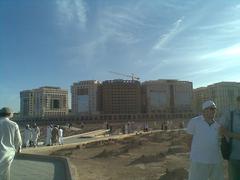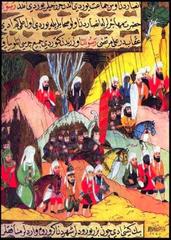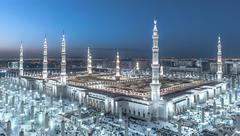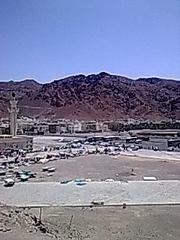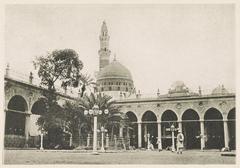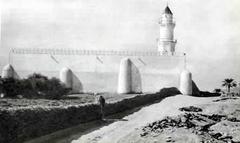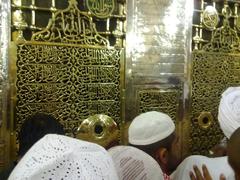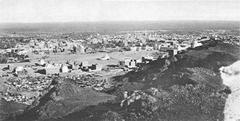Sayyid Ash-Shuhada Mosque Visiting Hours, Tickets, and Medina Historical Sites Guide
Date: 04/07/2025
Introduction
Nestled at the base of Mount Uhud in Medina, Saudi Arabia, Sayyid Ash-Shuhada Mosque stands as a powerful testament to Islamic history, spirituality, and collective memory. Commemorating the martyrs of the pivotal Battle of Uhud (625 CE), including the revered Hamzah ibn ‘Abd al-Muttalib—Prophet Muhammad’s uncle and “Sayyid al-Shuhada” (Master of the Martyrs)—the mosque intertwines historical reverence with contemporary architectural elegance. Since its establishment in 2017, the mosque has welcomed millions of pilgrims, history enthusiasts, and cultural travelers, offering not just a sacred space for worship and reflection but also an educational window into the origins of Islam. This comprehensive guide covers the mosque’s historical background, religious significance, architectural features, visiting hours, ticket policies, accessibility, and nearby historical attractions, ensuring you are fully prepared for a meaningful visit (visitalmadinah.com; aboutislam.net; madainproject.com).
Table of Contents
- Introduction
- Historical Context: The Battle of Uhud
- The Martyrs’ Legacy
- Establishment and Architecture
- Religious Importance and Pilgrimage
- Practical Visitor Information
- The Mosque’s Contemporary Role
- Integration with Medina’s Sacred Heritage
- Frequently Asked Questions (FAQ)
- Conclusion
- Sources
Historical Context: The Battle of Uhud
The Sayyid Ash-Shuhada Mosque’s origins are inseparably linked to the Battle of Uhud, fought in 625 CE between the Muslims of Medina and the Quraysh of Mecca. This defining conflict, taking place just north of Medina, saw the loss of many of the Prophet Muhammad’s closest companions and relatives, most notably Hamzah ibn ‘Abd al-Muttalib. Despite initial Muslim success, a breach of strategic orders led to significant casualties and established the site as one of somber reflection and spiritual learning (visitalmadinah.com). The graves of these martyrs, at the foot of Mount Uhud, have been a destination for remembrance since the earliest days of Islam (aboutislam.net).
The Martyrs’ Legacy
Hamzah ibn ‘Abd al-Muttalib’s bravery and ultimate sacrifice in the Battle of Uhud left a lasting mark on Islamic tradition. The Prophet Muhammad frequently visited the graves, encouraging remembrance, humility, and reflection on the devotion of those who gave their lives. This practice continues today, making the site an important stop for those visiting Medina (aboutislam.net).
Establishment and Architecture
Responding to increasing numbers of pilgrims, the Sayyid Ash-Shuhada Mosque was officially inaugurated in 2017. Its design harmonizes traditional Islamic architectural elements with modern functionality. The mosque features a hypostyle prayer hall (structured with rows of columns and separated spaces for men and women), a grand central dome, two elegant minarets, and beautifully landscaped gardens. Notably, the mosque avoids ornate decoration, in accordance with Islamic teachings that discourage the embellishment of graves, and instead emphasizes an atmosphere conducive to reflection and humility (madainproject.com; aboutislam.net).
Architectural Highlights
- Central Dome & Minarets: Enhance the mosque’s visual prominence and acoustics.
- Prayer Hall: Accommodates up to 15,000 worshippers; open, columned layout for accessibility and order.
- Mihrab & Minbar: Crafted with marble inlays and Quranic calligraphy, blending tradition with modernity.
- Lighting: Natural light via skylights by day; chandeliers and recessed lighting at night.
- Gardens & Walkways: Landscaped spaces for contemplation and rest (arabsstock.com; evendo.com).
Religious Importance and Pilgrimage
Visiting Sayyid Ash-Shuhada Mosque is considered a meritorious act, especially for pilgrims to Medina. The mosque invites worshippers to engage in prayer, remember the sacrifices of the martyrs, and reflect on early Islamic history. The Prophet’s own practice of visiting the martyrs’ graves set the tone for respectful pilgrimage, emphasizing humility and learning over veneration (visitalmadinah.com).
Practical Visitor Information
Visiting Hours
- General Opening: Daily from 5:00 AM to 10:00 PM; open for all five daily prayers and extended visiting hours for tourists.
- Prayer Restrictions: Non-Muslims may be asked to remain outside during prayer times.
Entrance and Ticket Details
- Entry: Completely free of charge; no tickets required.
- Guided Tours: Available through local operators and mosque administration, especially during religious events.
Accessibility
- Fully accessible with ramps, wide entrances, and designated prayer spaces for individuals with disabilities.
- Ample parking for private vehicles and tour buses; public transportation available via Medina’s bus network (lifeinsaudiarabia.net).
Travel Tips
- Dress Code: Modest attire required; women must cover their hair, men should wear long trousers and sleeves.
- Best Times to Visit: Early morning or late afternoon for cooler temperatures and fewer crowds, especially outside Hajj, Umrah, and Fridays.
- Etiquette: Shoes must be removed before entering the prayer halls; maintain respectful silence and behavior.
- Photography: Permitted in exterior and garden areas; avoid photographing worshippers or sensitive sites.
Facilities
- Modern ablution areas, restrooms, shaded walkways, gardens, shops, and cafés.
- Multilingual signage (Arabic and English); visitor assistance available.
Nearby Medina Historical Sites
- Mount Uhud & Battlefield: Adjacent to the mosque; site of the historic battle (nomadicsamuel.com).
- Martyrs of Uhud Cemetery: Final resting place of 70 companions, including Hamzah ibn ‘Abd al-Muttalib.
- Al-Masjid an-Nabawi (Prophet’s Mosque): Second holiest site in Islam, 5 km south (nomadicsamuel.com).
- Quba Mosque: The first mosque in Islam, about 7 km away.
- Al-Baqi Cemetery: Burial place of many of the Prophet’s family and companions.
- Al-Qiblatain Mosque: Renowned for its two qiblas.
- Old Bazaar & Local Markets: Vibrant shopping and cultural experience.
- Madinah Knowledge Economic City: Modern development with guided tours available.
The Mosque’s Contemporary Role
Sayyid Ash-Shuhada Mosque today is more than a place of worship; it serves as a center for religious education, community events, and spiritual enrichment. The mosque’s management ensures dignified maintenance, upholding the principles of humility and reverence in line with Islamic teachings (visitalmadinah.com).
Integration with Medina’s Sacred Heritage
The mosque is a vital part of Medina’s sacred landscape, contributing to the city’s spiritual vibrancy. As one of the world’s holiest cities, Medina attracts millions seeking to connect with the foundational stories of Islam, and Sayyid Ash-Shuhada Mosque offers a tangible link to those origins (visitalmadinah.com).
Frequently Asked Questions (FAQ)
Q: What are the visiting hours of Sayyid Ash-Shuhada Mosque?
A: Open daily from 5:00 AM to 10:00 PM; hours may vary seasonally and during Ramadan or special events.
Q: Is there an entrance fee or ticket required?
A: No, entry is free for all visitors.
Q: Are non-Muslims allowed to visit?
A: Non-Muslims may visit exterior areas but may be restricted during prayer times and in core religious precincts.
Q: Are guided tours available?
A: Yes, local operators and mosque administration offer guided tours, especially during religious occasions.
Q: What should I wear?
A: Modest clothing; men should wear long trousers and sleeves, women should wear an abaya and cover their hair.
Q: Is the mosque accessible for people with disabilities?
A: Yes, with ramps, wide entrances, and accessible facilities.
Conclusion
A visit to Sayyid Ash-Shuhada Mosque offers a unique opportunity to engage with one of Islam’s most significant historical and spiritual sites. With free access, thoughtful architectural design, and close proximity to other Medina landmarks, the mosque is a must-visit for pilgrims and travelers alike. For a richer visit, consider guided tours, respect local customs, and take time to explore the broader historical landscape of Medina.
Download the Audiala app for personalized Medina travel guides, prayer times, and updates. Connect with the community by sharing your experience on social media and explore more related articles on Medina’s sacred heritage.
Sources and Official Links
- The Significance of Madinah or Medina, Visit Al Madinah
- Story of the Mosque Named After the Prophet’s Uncle, About Islam
- Sayed As Shuhada (Medina), Madain Project
- Sayyid Ash-Shuhada Mosque Architecture Image, Arabsstock
- Masjid Sayyid Al-Shuhada Attraction, Evendo
- Medina Metro City Bus Map, Life in Saudi Arabia
- Medina Travel Guide, Nomadic Samuel
- Wanderlog: Masjid Sayyid al-Shuhada
